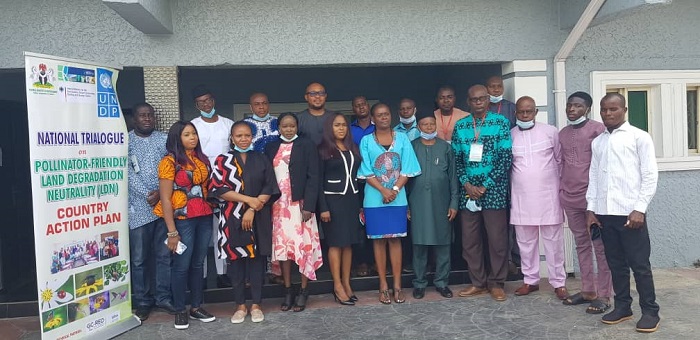A group of ecologists has authenticated a workplan aimed at protecting pollinating species threatened with extinction.

At a meeting held in Uyo, Akwa Ibom State, on Thursday, October 15, 2021, participants validated the National Trialogue on Pollinator-Friendly Land Degradation Neutrality (LDN) Country Action Plan’s multi-year workplan.
Reviewed and adopted in July 2019, the LDN Country Action Plan was produced from the Biodiversity and Ecosystem Services Network (BES-Net) third “Anglophone Africa Regional Trialogue: Bright Spots for Land Degradation Neutrality (LDN), Pollinators and Food Security” workshop held from May 28 to 30, 2019 in Nairobi, Kenya.
BES-Net is a capacity sharing “network of networks” that promotes dialogue between science, policy and practice for more effective management of biodiversity and ecosystems, contributing to long-term human well-being and sustainable development.
During the trialogue, the participants reviewed the status of pollinators and broader land ecosystems in the region; analysed their importance to sustainable local food production, climate resilience and food security; and discussed ways to address the challenges of invasive pests and pathogens, land-use change and pesticide use.
Accordingly, a set of response options, or Trialogue action plans were identified on how to face the observed obstacles and maximise important co-benefits of sustainable management and protection of pollinators and their habitats in each of the target countries.
Following the event, the Trialogue participants from Nigeria spearheaded the implementation of the Trialogue action plans proactively within their capacity. These voluntary activities include, among others:
- Joining the Coalition of the Willing on Pollinators, a global alliance of like-minded countries for promoting pollinator protection, and formulated the national pollinators strategy;
- Planning to develop a national database on pollinators, carry out the pollinator status/trend studies and undertake the land degradation assessment/mapping; and
- Organisation of a series of communities/school awareness raising and sensitization sessions on the protection of pollinators and their habitats.
On Thursday, July 25, 2019 in Abuja, officials of the Forestry Department in the Federal Ministry of Environment signed the Declaration of the Coalition of the Willing on Pollinators, an alliance aimed at promoting pollinator protection in countries. The signing affirmed the nation’s intent to act and implement a national strategy to protect pollinating species threatened with extinction.
Following the post-Trialogue commitment displayed by the team from Nigeria in implementing their post-Trialogue Action plan, BES-Net is providing seed fund to support the implementation of the Action plan priorities in Nigeria and promote the uptake of the IPBES assessments into national policy in line with national biodiversity priorities.
The national project will be implemented for two years. Catalytic financial support of $346,455.45 will be allocated to the UNDP Country Office (CO) in Nigeria through the BES-Net II’s BES Solution Fund. An additional $10,000 has been issued to CO as a preparation grant for the development of the two-year work plan.
UNDP Nigeria Country Office will provide overall technical guidance for the implementation of the project activities. The project will be implemented in collaboration with the various stakeholders including the Food and Agriculture Organisation (FAO) Nigeria Office at the national/regional level, as well as UNDP Global Policy Centre on Resilient Ecosystem and Desertification and UNESCO at the global level.
Mr Muyiwa Odele of the UNDP said while opening the validation meeting: “One of the areas that the UNDP has strongly advocated for is to make sure that the BES-Net work in Nigeria actually sits within existing national priorities. So today, we have had the privilege of inviting a few people who in their own right are experts and will share with you some of the cutting-edge work that they are doing that has implications for our BES-Net work and we can even draw inspiration from some of the activities that we will be validating today.
“The government of Nigeria is currently working on a medium to longer term development goal and food security is one of the focus areas. And the reality for Nigeria to transit from oil-based economy to a greener economy. The food secured nature is what I think the President and his team are grappling with right now. So we have a lot of opportunities to site our work into ongoing national priorities and I will be counting on all of you to share some experiences with us on we can do this.”
Other speakers include Yuko Karauchi, a Policy Specialist, Intergovernmental Science-Policy Platform on Biodiversity and Ecosystem Services (IPBES), who offered some remarks about BES-Net.
Marlyn Omondi,.Technical Officer at BES-Net, presented the Multi-year work plan of the Pollinator LDN Action Plan for Nigeria.
Rhoda Dia, Coordinator of the UNDP-GEF Food Security Project, stated that the scheme, which commenced in December 2017, would be rounded up next year.
Thomas Emmanuel, a landscape planner with Dreamscape Resources whose organization has been propagating the Costus Spectabilis (a flowering plant specie depicted in Nigeria’s Coat of Arms), wants it identified as a pollinator attracting plant.
He said: “This would also help combat the national plant’s obscurity, and Costus Spectabilis status as a national plant would also have positive effects on the project.
“Costus Spectabilis being a healthy tasty herb, its farming will also boost food production. This is a unique venture and market opportunity.”
After a review of the Multi-year work plan, participants proceeded to validate the blueprint, which listed outputs to include:
- Strengthening national BES platform;
- Scoping Assessment of pollinators and pollinator services and threats to pollinators in three selected sites;
- Development of a pollinator app, web-based illustrated identification guide and pollinator information management system (PIMS) to promote awareness and advocacy for pollinators;
- Development of a National Pollinator strategyand integrated pest management (IPM) strategy;
- Capacity development for target communities on community-based participatory approach Plant-Pollinator Conservation;and,
- Agro-ecological practices for the management and development of pollinator ecosystem services.
